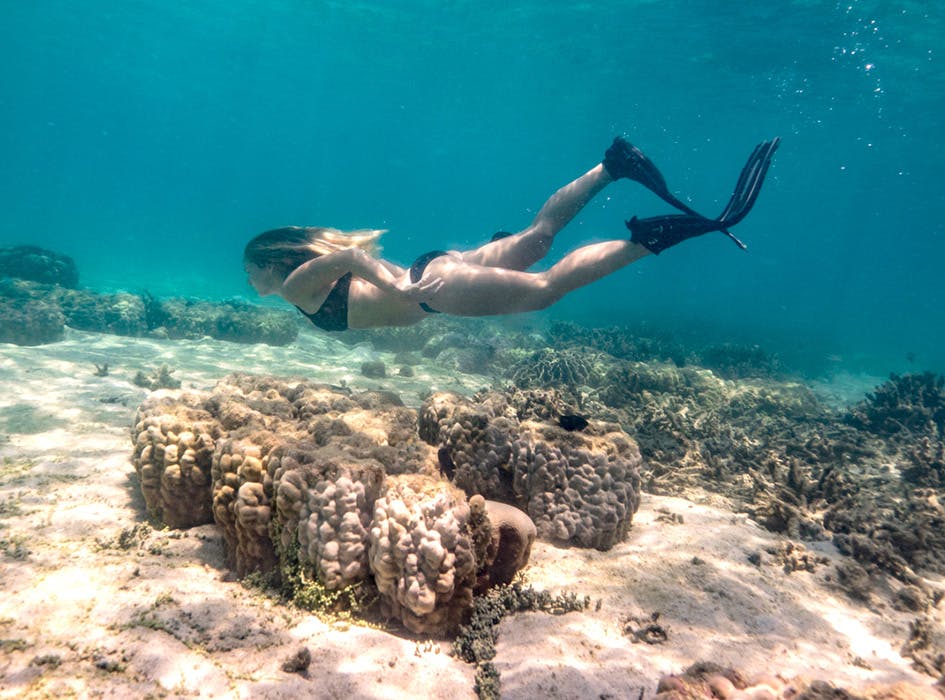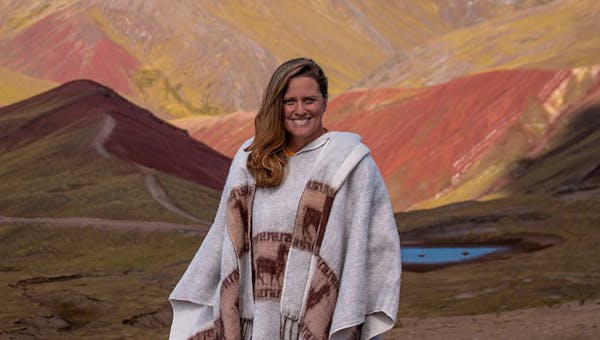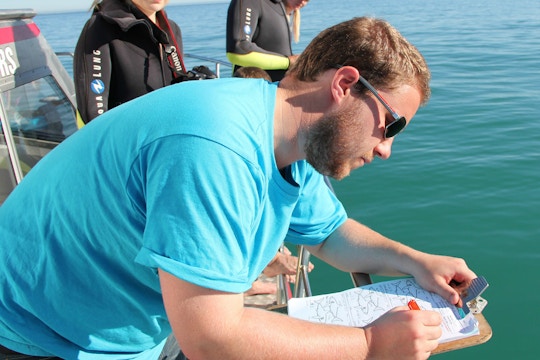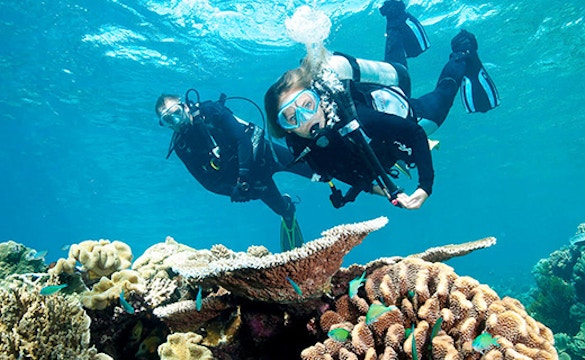IVHQ was incredibly helpful and I had no worries due to their quick responses. Everything was super well organised, especially the preparation guides which really helped prepare me for what to expect. I’ve gained the most amazing friends, friends for life, I underestimated the truth when people say on trips like these you meet great people. Even the staff were incredible and I’ll miss them a lot. I’ve gained confidence, as this has been my first time traveling and I’m still young, and I'm proud of myself for completing it. I'd tell someone who’s hesitant to just do it. Go for it and you won’t regret it because it’s a trip of a lifetime!

Turtle Conservation Volunteer Program in Madagascar
Purpose
Start dates
Duration
Volunteer hours
Age
Accommodation
Program fees
What's included
Who is going?
Group video calls
Once you have secured your place, join regular video calls to meet your Program Manager and other volunteers before your trip.
This program is ideal for:
Project details
Excited to be a Turtle Conservation volunteer in Madagascar? International Volunteer HQ’s Turtle Conservation project empowers volunteers to assist with efforts to help grow and protect the population of endangered turtles that nest on the sandy beaches of Madagascar. Volunteers gain experience of turtle care and conservation while providing help to identify, develop and safeguard turtle nesting zones so these spectacular creatures can thrive well into the future.
What to expect and how you'll make an impact
Turtle populations in Madagascar face a wide range of survival challenges, but human intervention can go a long way in protecting these magical creatures, especially in the vital early stages of their lives. By helping to find and protect turtle nesting zones, volunteers aid an important part of the turtle conservation process. Volunteering with turtles is not only a great way to help the animals, it’s also a unique opportunity to get up close to some of the world’s most beloved creatures.
Depending on the time of year, you will either be based at the main base in Turtle Cove on Nosy Komba or in the village of Ampohana - situated on a pristine white sand beach lined with coconut and fir trees, on mainland Madagascar, where a safe turtle nesting zone has been identified.
This project is open year-round, though your role as a volunteer will vary based on the time of year:
- November to April: Nesting season. You’ll help to collect and record species information, nesting and size-related data for estimating population dynamics and nesting distributions.
- May to October: Off-nesting season. You’ll help to establish areas of turtle activity, identifying population size, re-establishing nesting beaches, conducting seagrass “snorkeling” surveys, and taking part in turtle watches and beach clean-ups.
All Turtle Conservation volunteers are required to bring the following items to Madagascar, as these are not available for purchase on the island of Nosy Komba: a snorkel, a mask, and fins.
Turtle Conservation volunteers may also have the opportunity to help with education programs promoting the protection of Madagascar’s turtles in the community. It’s also possible for you to assist on small construction projects, creating eco-bricks and bamboo straws and also go on forest hikes in the surrounding area.
You will receive comprehensive training prior to commencing with research and conservation activities. Training includes species identification, equipment usage and data collection protocols, to help prepare for the hands-on work to come. This initial training will also include information on the project goals and how to best assist in achieving these goals. Once training has been completed, you will begin survey work by visiting remote beaches on the surrounding islands.
Why do Turtle Conservation volunteering in Nosy Komba with IVHQ?
When you volunteer with turtles in Madagascar you’ll be adding value to the local community, while also developing personally and professionally by:
- Helping boost numbers of endangered turtles
- Contributing to marine conservation efforts
- Developing your communication skills
- Gaining turtle conservation experience
- Immersing yourself in Malagasy culture
- Discovering Madagascar’s underwater world
Volunteer requirements
- To join the Turtle Conservation project in Madagascar you’ll need to be a competent swimmer
- A good level of physical fitness and agility is required to join the Madagascar program
- Volunteers aged 16 or 17 must be accompanied by a parent, guardian or friend aged 18 years or older in order to participate in this program
- All volunteers are required to provide a criminal background check to IVHQ prior to departure. Those aged 16 or 17, if unable to obtain a criminal background check, can provide two character reference letters instead
- All volunteers are required to have adequate volunteer travel insurance
- All volunteers must speak fluent English
- While fluency in French or Malagasy is not a prerequisite, we recommend volunteers learn some basic words and phrases as this will help immensely with day-to-day volunteer work and communicating with local people.
Are you eligible to volunteer?
Submit a free application so we can confirm your eligibility and check availability for your preferred dates.
Not sure which program to join?
Get personalized recommendations >
Who is going?
Group video calls
Once you have secured your place, join regular video calls to meet your Program Manager and other volunteers before your trip.
Madagascar photo gallery



















What recent volunteers said about their IVHQ experience
All the information IVHQ provided was laid out in a way that made the whole process very easy to follow. My IVHQ Program Manager was extremely helpful & easy to reach whenever I needed her for anything! Life’s not a dress rehearsal, get out there & get amongst it!! Meet fantastic people in a fantastic location for a fantastic cause!
The experience and hospitality of the local team was terrific. The sights and many species and abundant marine life observed very impressive!!
One month was too short and I wish I could've stayed for MUCH longer! I hope and plan to return for a longer period one day :)
Ampang has my heart! I went into this program having zero idea what to expect, I just always knew I wanted to teach English in Madagascar. The whole experience exceeded any expectations by 1000x. The staff is awesome, I've made so many close friends there and I loved learning the language and about the culture. Teaching there has made a huge impact on me and I am forever grateful for the experience and opportunity.
Everybody I met was amazing and so welcoming to me. I loved talking to people from all over the world and was probably the best part about the experience. The biggest impact the program had on me was discovering what a new culture is like in person. Madagascar was nothing like I’ve ever seen before and has really humbled me about my views of cultures from across the world. It was a step out of comfort zones, but it is insanely worth it!!
Meeting people from everywhere around the world and the program staff was my favourite part of this program! The people had a big impact on me. If you want to volunteer, do it! It's better to do it scared than to not do it at all!
To read all reviews, visit our reviews page.
Academic course credit

Academic course credit
Gain course credit from your college or university and meet your academic requirements when completing a volunteer abroad program with International Volunteer HQ!
Learn about course creditLocation

Location
There’s far more to Madagascar than its famous lemurs. As well as its impressively vast diversity of wildlife, the island nation off the south-eastern coast of Africa has an interesting marriage of French, African and Southeast Asian cultures; breathtaking scenery and dreamy beaches.
It’s also a place where the majority of people don’t have good access to food, healthcare, education or other basic necessities. While there are steps being taken to improve this situation, Madagascar remains one of the most impoverished countries in the world. Volunteers can be part of the solution by choosing projects that have a meaningful impact on the lives of local people and support communities to help themselves.
The IVHQ Madagascar volunteer abroad program is based on the slopes of Nosy Komba, a small island off the northwest coast of Madagascar and only a few kilometers from the larger island of Nosy Be. Some project activities will take place in Ampohana depending on the turtle activity at the time as well as completing work at the main volunteer base on Nosy Komba.
Arrival and orientation
The program orientation begins on the first and third Monday of every month. Volunteers need to arrive in Nosy Be before 12 noon on the Sunday before orientation.
After you have registered for the program, please book your flights to arrive in Madagascar. There are two options for flying to the Madagascar program - Fascene Airport (NOS) in Nosy Be is the most convenient for an airport pick-up, however you can fly to Ivato Airport (TNR) in Antananarivo. Some volunteers choose to fly to Antananarivo and take a connecting flight or two-three day bus (and boat taxi) to Nosy Be. If you are interested in taking the bus, please reach out to your Program Manager for more information once you have registered. If you want an easy arrival, we recommend flying to Nosy Be.
If flying into Fascene Airport (NOS) in Nosy Be and arriving before 12 noon, you will be greeted at the airport by a member of the local team and transported to the volunteer accommodation on Nosy Komba. Your accommodation is covered by your Program Fee and includes the night before your program orientation. If your flight arrives after 12 noon, you will still be met at the airport but will need to stay in Nosy Be for the night to then travel by boat to Nosy Komba the following morning. This night of accommodation will be at your own expense and you will need to book this in advance of your arrival. Your IVHQ Program Manager will be happy to send you recommendations of affordable hotels in Hellville that are within walking distance of many shops and restaurants.
If you are travelling in Madagascar prior to your volunteer program, we can arrange for you to be picked up in Nosy Be before 12 noon on the day before your program orientation. You will be taken to Nosy Komba by boat.
Orientation is hosted by our Madagascar team at the volunteer accommodation on Nosy Komba. Orientation begins on the morning of your chosen start date and covers everything you need to know for your volunteer program in Madagascar – an introduction to Madagascar, culture and customs, rules and expectations, safety, travel opportunities and an introduction to project and placement. The orientation will also give you a chance to meet other volunteers.
Volunteer schedule example
First day
You will be taken to your placement by a local coordinator and introduced to the placement staff you will be working with. Volunteers work for approximately 5 to 8 hours per day.
Weekdays
Volunteers work for approximately 5 to 8 hours per day, but start times and daily workloads depend on the project. A typical schedule is as follows:
| 6:00 - 8:00 AM | Breakfast at camp prepared by our in-house cooks. |
| 8:00 - 11:30 AM | Volunteers travel to and begin projects. |
| 12:00 PM | Lunch at camp prepared by our in-house cooks. |
| 1:30 PM | Volunteer afternoon activities begin. |
| 4:00 - 5:00 PM | Volunteer activities for the day typically conclude. |
| 6:00 PM | Dinner at camp prepared by our in-house cooks. |
| 6:45 PM | Board briefing to go over activities for the following day. |
Weekends
There is no shortage of things to do on Nosy Komba, Nosy Be or Ampohana so volunteers can fill their free time with adventurous activities, or simply take in the ‘mora mora’ or ‘slowly, slowly’ Malagasy way of life.
Nosy Komba itself is a popular tourist spot for buying local crafts from the winding markets and beachfront stalls. There are also opportunities to join local village guides to encounter friendly lemurs and see other Malagasy wildlife and plants.
The neighboring island of Nosy Be can be reached in 30 to 45 minutes by boat taxi and is a popular destination for volunteers during the weekend. Taxis are available on the island and can be taken to most areas including the sacred lakes, beaches and waterfalls of Nosy Be.
Volunteers staying for longer durations, or who wish to travel before or after their program, can visit areas further afield on the mainland of Madagascar. The most popular destination is Diego Suarez in the North. En route from Nosy Be to Diego Suarez, volunteers can visit the Ankarana and Mont d’Ambre National Parks. In Diego Suarez, there are plenty of adventure-sports activities on offer, such as kite boarding or quad biking on dunes, or snorkeling in the Emerald Sea. Horse riding and deep sea fishing trips can also be arranged from Nosy Be. Volunteers can also visit the Avenue of the Baobabs, in the Menabe region of western Madagascar, where beautiful ancient trees line both sides of the road between Morondava and Belon’i Tsiribihina.
Accommodation and WiFi
For Turtle Conservation volunteers, you will be based between the main camp on Nosy Komba and the secondary camp on Ampohana Beach depending on the turtle activity during the nesting season, you’ll be accommodated in a basic beach bungalow with solar powered lighting, flushing toilets and cold water showers. You’ll need to bring your own light sleeping bag, pillow, pillowcase, mosquito net and bath/beach towels.
Power for lights is supplied from solar panels and there is a backup generator for staff that may run 1 - 2 hours per week. Volunteers are encouraged to minimize the amount of electronic equipment they bring as the camp only has limited power points available to charge devices. As there is no other electricity at camp we recommend volunteers bring solar chargers for their devices, if possible.
WiFi is accessible in the local village and you can also purchase a local SIM card with data for an unlocked mobile phone when you arrive in Madagascar.
Meals
Volunteers are served three meals per day, prepared in the traditional Madagascan style by an on-site Malagasy cook.
Meals are basic, but nutritious and tasty. Breakfast ranges from pancakes to eggs or bread with condiments. Lunch is rice or pasta based, and dinner is rice based. Both lunch and dinner will usually be either chicken, zebu (beef) or fish, all with vegetables, beans and sauce.
Volunteers on the Turtle Conservation project in Ampohana can purchase snacks from a small shop in the village.


















Pricing
Spots are limited. For a Registration Fee of just US$329 (approximately AU$527) you secure your spot and unlock all our preparation and training tools.
You don't need to worry about paying your Program Fee until you get closer to your start date.
Duration |
Program FeeDue 30 days before you start, or within 48 hours if you register inside of 30 days. Covers the cost of hosting you.
|
|---|---|
| 1 week | $500 Equivalent to $71/day |
| 2 weeks | $760 Equivalent to $54/day |
| 3 weeks | $1,030 Equivalent to $49/day |
| 4 weeks | $1,300 Equivalent to $46/day |
| 5 weeks | $1,570 Equivalent to $45/day |
| 6 weeks | $1,840 Equivalent to $44/day |
| 8 weeks | $2,380 Equivalent to $43/day |
| 10 weeks | $2,920 Equivalent to $42/day |
| 12 weeks | $3,460 Equivalent to $41/day |
- All programs attract a Registration Fee of US$329 (approximately AU$527) in addition to the Program Fee. This covers all pre-departure support services.
- A 5% international banking fee is added at point of payment.
- Recommended spending money: Volunteers in Madagascar generally find US$70-120 per week to be sufficient for expenses.
- Breakfast, lunch and dinner
- Airport pick-up
- Accommodation
- 24/7 in-country support
- In-country program orientation
- Pre-departure support from your Program Manager
- Personalised preparation tools, guides and check lists
- Access to IVHQ’s preferred insurance and flights partners
- Certificate of International Volunteer Service
Learn more about what's included in your IVHQ Registration Fee and Program Fee.
- Return to the airport when your program finishes
- Flights
- Visa (if required), travel insurance (mandatory), vaccinations, criminal background check.
- Personal spending money for snacks, laundry, public transportation, drinks and leisure activities during your free time.
Check what's required to visit Madagascar
Safety and support

Safety and support
IVHQ follows best practice and industry-leading health and safety procedures, which are regularly reviewed and optimized as part of the B Corporation recertification.
- All volunteers encouraged to complete our interactive pre-departure training.
- All local teams trained on best practice volunteer management & First Aid.
- All IVHQ programs are required to adhere to IVHQ's Risk Management Policy.
- All volunteers have access to 24/7 in-country support from our local team.
Essential country information
Essential country information
| Capital | Antananarivo |
| Population | 26.97 million |
| Languages | Malagasy and French |
| Currency | Malagasy Ariary (ARA) |
| Time zone | UTC+03:00 |
Weather and climate
The climate of Madagascar varies due to the topographic differences and trade winds from the Indian ocean. Typically the climate is tropical along the coast, temperate inland and arid in the south. There is a wet, warm season from November to April with most rainfall covering the eastern coast. There is a cooler, dry season from May to October. Temperatures fall between an average of 18°C (64°F) to 30°C (86°F) throughout the year, with the lowest temperature dropping to 12°C (54°F) and highest reaching 36°C (96°F).
Latest blog posts
Other projects you may be interested in



















